At SEJ, we’ve done hundreds of interviews, polls, and now #SEJSurveySays to learn from other SEO marketers. And, about a month ago, I sent a survey to 215 SEOs to discuss what they are currently working on. Here’s what I discovered.
Over the past year, the SEO industry has done a lot of changing.
We’ve all had hundreds of conversations at conferences, on podcasts, and through emails to debate the future of search marketing.
At our weekly SEJ editorial meetings, our amazing news writers Matt Southern and Danny Goodwin give the SEJ team incredibly valuable insights into the changing landscape of SEO.
And, when a new Google algorithm update hits or Facebook updates their metrics, the SEJ team uses it as an opportunity to learn, grow, and share with the SEO community.
But one of the biggest challenges we face as an SEO industry as a whole is uniting our efforts and learning from each other. For example, I get tons of emails for new article pitches. Juicy, brilliant, (and sometimes spammy) article pitches that give me insight into the top minds and tools in SEO.
And that insight is super valuable.
But I haven’t been very good at turning that insight into shareable data that every SEO marketer can use to benchmark themselves.
That’s why I decided to put together this survey. On July 28, I sent this email 215 SEO marketers.
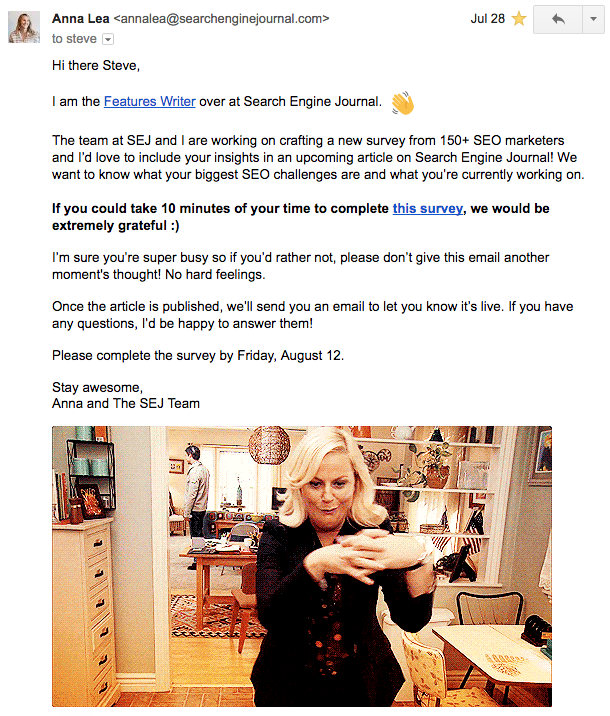
I was blown away by the response. I expected a few people to write me back, but my inbox quickly began to flood.
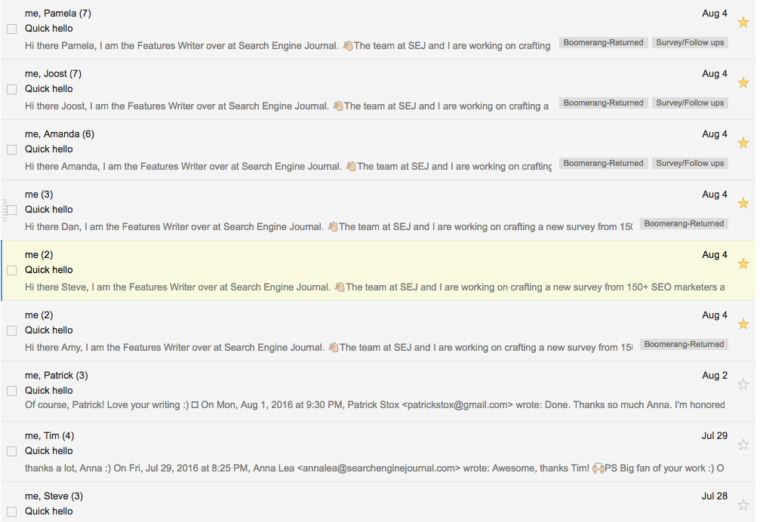
I listened and learned from other SEOs to get inspired about their current projects they are working on, what their aspirations are, and what future SEO projects they have planned.
I surveyed and spoke to the 64 top search and online marketers, agencies, CEOs, and consultants to bring you these insights. I hope you find them inspiring and helpful.
Putting Together the SEO Survey
First and foremost, I want to give a big thank you to all the 64 SEOs that took the time to contribute to our survey. I know you all have very busy schedules so I’m extremely grateful for your feedback to help make this article. You have all inspired me and motivated me to create new projects and focus on different areas of SEO! Thank you. If you participated in this, I’d love to get your comments below!
Also, if you didn’t get a chance to participate in the survey, please fill out the Typeform at the bottom of this post to be a part of upcoming surveys.
Since starting this post, I’ve received a few emails and responses to my survey expressing gratitude for putting this together.
And, while I put this survey together for my own selfish reasons of wanting to know what others in my field are working on, I’m wishing we could all be more open about what we’re working on daily.
It would help all of us — beginner SEOs and seasoned searchers alike — better understand our ever-evolving space and benchmark our efforts.
Below you’ll find the questions I asked and the answers I received. I hope you find it as inspirational and actionable as I did. I’m excited to see you all start putting these ideas to use!
Here’s how I broke it down…
Where is the Majority of Your Time Spent?
The obvious first question is: Where is the majority of your time spent?
I weighed a number of questions and decided to start with this one first because it felt like a good place to build some groundwork.
More than 25% of SEO marketers said the majority of their time is spent on technical and onsite SEO projects.
These projects were broken down into three buckets:
- On-site
- Off-site
- Technical
- Other
Other topics included:
- Writing
- Research and analysis
- Management
- Sales
- Finding unicorns (thanks 🙌, Larry Kim!)

What SEO Tasks Do You Spend Most of Your Day Working On?
Almost 72% of people surveyed said they spent most of their day creating quality content.
These projects were broken down into:
- Removing duplicate content
- Navigation & UX
- Data (Google Analytics & Google Search Console)
- Keyword research
- Creating quality content
- Building relevant backlinks
- Editing metadata
- Mobile optimization
- Other
A few of the other topics people mentioned:
- Convincing client and development teams to implement SEO strategies.
- Relationship building with bloggers and influencers.
- Meetings
- Email marketing

What are Your Biggest SEO Challenges Right Now?
Over 28% of marketers surveyed said one of their biggest SEO challenge was building relevant backlinks.
The projects were listed as the same above:
- Removing duplicate content
- Navigation & UX
- Data (Google Analytics & Google Search Console)
- Keyword research
- Creating quality content
- Building relevant backlinks
- Editing metadata
- Mobile optimization
- Other
Here are a few of the other topics:
- Implementing optimizations in a timely way.
- Creating a process that is scalable.
- Getting company buy-in.
- Hiring people with the necessary focus and aptitude.

Now, let’s hear from the SEO marketers themselves…
What are Your Current Aspirations for SEO?
Rand Fishkin, Moz:
“We’ve lost rankings on many of our most important keywords, and while traffic overall has grown, we’re missing many potential customers we used to capture.”
Tim Soulo, Ahrefs:
“I believe that SEO starts with your product. If your product is not superior to any other alternatives – then you don’t deserve to rank, no matter how many backlinks you build. But when your product is amazing – people will link to you naturally and you will rank higher and higher in search.”
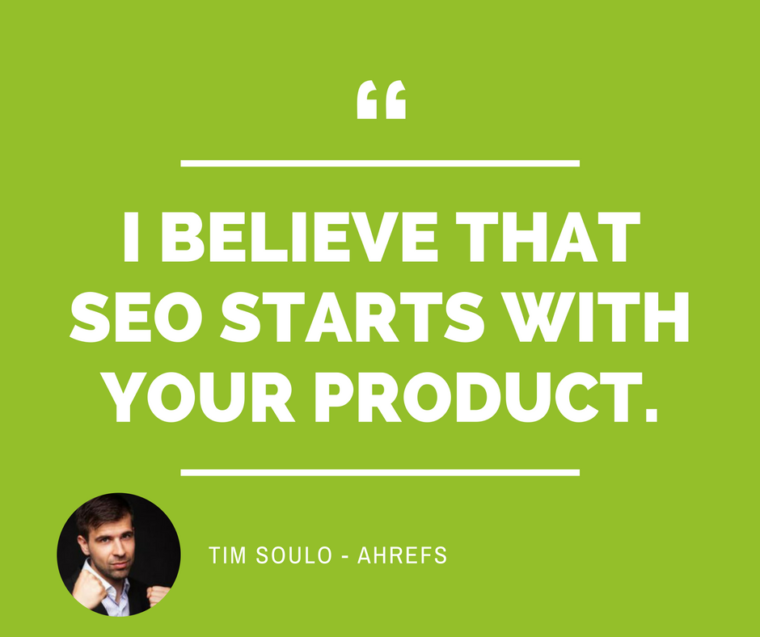 Amy Merrill, Page One Power:
Amy Merrill, Page One Power:
“I would like to see content marketing, PR, social teams and onsite content teams and link building teams working more holistically. Ultimately the work being done by each group is part of a complete puzzle, but in many cases, these groups are segmented and not working cohesively which benefits no one.”
Eric Enge, Stone Temple Consulting:
“I’d like to see the industry better understand how important quality content and backlinks are. It sounds trite and obvious, but it’s crazy how many companies don’t invest in these things.”
Bill Slawski, SEO by the Sea:
“Understanding how a thematic model and an entity model can work together to improve the quality of a website.”
Dan R Morris, Blogging Concentrated:
“Our goal is to teach people you can’t “SEO a website”. SEO is a culture you build into your business. It’s not a task. It’s how you operate.”
Maddy Osman, The Blogsmith:
“I hope that as search engines become smarter, it will be easier to be found for quality content without such a keyword focus. I want to be able to create content that’s 100% for the human, not the machine.
Katy Katz, Inturact:
“While there are priorities that are unique to both SEO and content, a lot of the major qualifications for success in these two realms overlap. Today, you cannot be successful at one without the other. It is my hope that businesses will understand the interconnectedness of SEO and content marketing and build a strategy to support it.”
Jason White, Dragon Search:
“We’re marketing and we should speak in marketing/business terms. Tie tactics to ROI. Keep our client’s best interest first. Empower them to own their own data and not be beholden to a provider.”
Rocco Baldassarre, Zebra Advertisement:
“Creating quality content that people want to share. That sounds easy but it is very difficult to achieve on a constant basis.”
Kristen Glehan, Central Hudson Gas & Electric Corporation:
“For there to be greater ease in building a more immediate authority of multiple topic sites, especially on an enterprise level.”
Stoney deGeyter, Pole Position Marketing:
“Quality work, quantity results.”
What are Your Aspirations for the Future of Your SEO Efforts?
Chris Berkley, Seer Interactive:
“SEO needs to integrate more with CRO, specifically. Several of my clients have relaunched websites and lost conversions because of on-site issues that have nothing to do with traffic or rankings. We can’t just say “that’s not an SEO issue, sorry.”
Prashant Puri, AdLift:
“To have Google use a more 360-degree approach to qualifying a website. Internally at AdLift, we’re seeing some of this happening. Example: Landing page metrics are being used as ranking signals – however, we’d like to see a deeper integration into social signals.”
David Farkas, The Upper Ranks:
“I believe links will remain one of the core ingredients to the algorithm for the foreseeable future. And here at The Upper Ranks, we plan to continue building the heck out of them.”
Larry Kim, WordStream:
“Crazy-high organic click-through rates!”
Eli Schwartz, Survey Monkey:
“Understanding user intent and building content that matches the intent behind the queries.”
Steve Guberman, The Golf Channel:
“Mobile! A lot of revenue is derived from our mobile apps. A primary emphasis for the remainder of this year is mobile.”
Nick Wilsdon, Vodafone Group:
“My aspirations are focused on increasing SEO capability within Vodafone group. That approach helps us effectively work with internal partners, agencies, and suppliers within the SEO program. Only together can we meet the significant digital challenges facing search over the next two years.”
Jessica Roberts, Footprint Digital:
“My goal is to continue to evolve my content writing and marketing skills to keep up with the ever-changing world of SEO.”
Jordan Kasteler, Digital Marketing Consultant:
“The future of my SEO efforts will be all about adapting to change but not reacting. Reactions, to new feature releases or statements, from Google, can leave SEOs wasting resources chasing their tale. But waiting for releases or statements to prove themselves worthy, and then adapting, is what the future is about. Otherwise, trend chasers and newcomers may be shooting themselves in the foot.”
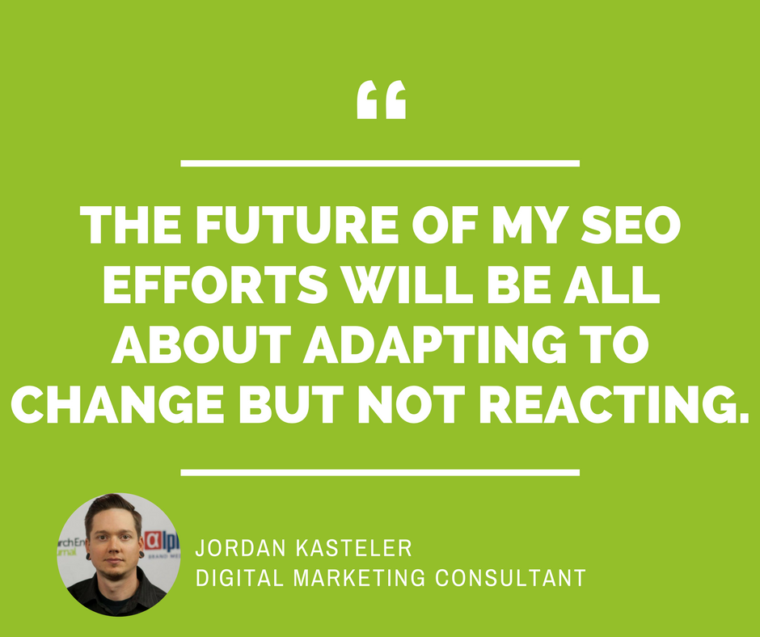 Joe Hall, Hall Analysis:
Joe Hall, Hall Analysis:
“To develop more tools and software for the SEO community and my clients.”
What Is the Biggest SEO Project You’re Working On?
Clint Henderson, WiredSEO:
“Central Security Group – We do all their Digital Marketing, they’ve seen 50% rev growth to $91M and just made the 2016 Inc 5,000 fastest growing companies in America. Our goal is to make them into the top 3 security providers in the United States.”
Brian Harnish, ymarketing:
“Link remediation, link removals for United Healthcare at the agency I work for: ymarketing.”
Rachel Standley, Fire Mountain Gems and Beads:
“Updating large sections of our existing content to reach a larger search audience.”
Chris Campbell, ReviewTrackers:
“We are doing an audit of the 1,000+ blog posts to understand how visitors share, engage and read our content. We are utilizing this data to better understand what articles our visitors want to read.”
Allison Fabella, Atlanta-Journal Constitution:
“Integrating technical enhancements with targeted content initiatives.”
Roger Montti, MartiniBuster:
“Managing my stable of sites that are in dozens of niches while also launching new projects. It’s like having children. Some need more attention than others.”
Amanda DiSilvestro, HigherVisibility:
“Content! It’s all about writing content. I’m actually currently trying to get better at creating infographics.”
 Garth O’Brien, GoDaddy:
Garth O’Brien, GoDaddy:
“Right now we are investigating our entire navigation suite and organizing our content in a meaningful manner.”
Ryan Clutter, 1SEO Digital Agency:
“My company is set to launch a new website, completely redesigned for the best user experience. I’m working on making sure all metas and titles are in place, while the content fully supports the topic of the page. It’s been a long process of optimizing more than 100 pages of content, but the end is near and I’m excited to see the company reach its goals with both the design of the website and the user experience on each page.“
Markelle Harden, Avista PR:
“Guiding content initiatives for companies that have established brands in Europe and are expanding into the US.”
What’s the One Thing That has Brought You the Most Results in the SERPs?
Daniella Galuppi, Digital Marketer:
“Video content hosted onsite.”
Julia McCoy, Express Writers:
“Adding long-form content (2000+ word blogs) around low competition keywords. Infographics with transcripts have brought us high rankings, too.”
 Brent Carnduff, Digital Marketer for Real Estate Industry:
Brent Carnduff, Digital Marketer for Real Estate Industry:
“The clients that I work with are small firms looking to gain local traction with the search engines. With all of the changes in search and all of the talk of the “death” of SEO, I still find that the fundamentals of SEO are most effective for them. Good on-page SEO and application of keywords have an amazing impact.”
Ryan Jones, WTFSEO:
“Find out what task my customers are trying to accomplish, then build something that makes it easier for them. Fill the gap that the competition isn’t properly serving.”
Larry Engel, Fathom Marketing:
“I’ve recently noticed a shift in Google toward showing “utilitarian” results rather than “informational” results. In other words, in our niche, Google used to show results focused on answering the What of the query. Now the search results mostly focus on the How.”
Patrick Stox, IBM:
“Trying a few different ways to map content by similarity so that I can generate millions of redirects from old pages (pulled from the Wayback CDX Server API) automatically.”
Steve Wiideman, Wiideman Consulting Group:
“Obsessing about the page performance, not the website performance has brought us the best results over time.”
Mike Van Der Heijden, Konnect Digital:
“Page relevance. Being able to answer a “query” better than competing websites.”
Michael Hodgdon, Infront Webworks:
“Local SEO- Understanding local algorithms, partnering with google’s related programs in order to obtain optimum results and stay current with best practices.”
Andrew Dennis, Page One Power:
“Consistently publishing in-depth, quality content on our blog as well as highly-visible, third-party industry publications.”
Shane Barker, Influencer Marketing Consultant:
“High authority links with great content.”
Annie Singer, Heal That Pain:
“I saw a pretty substantial jump in traffic after acquiring about 5 solid backlinks within about a 2-week period.”
Adam Riemer, Online Marketing Strategist:
“Quality content. By creating really good and engaging pieces we attract a ton of links. From there we build a strong internal linking structure to rank the main site. Quality content isn’t just written words. It’s funny stunts we pull in public to get noticed, it’s being part of an event and also just taking photos of things that people would want to share and link to.”
How has Your SEO Efforts Evolved Over the Past Year With the Introduction of Rankbrain, Amp Pages, Etc.?
Katina Beveridge, Strategic SEO:
“My SEO methods have gone from thinking just about onsite issues and link building to more link baiting and enhancing my digital marketer. knowledge. It is now all about creating content that will please the end-user, google and bring in conversions for the client. We are offering a holistic approach to SEO. and content marketing.”
Casey Markee, MediaWyse:
“By further reinforcing my long-held belief that the only constant in SEO is “change.” SEO is a marathon, not a sprint. My goal is to educate clients on the role of each of these new strategies and revolutions and devise a path forward that “hopefully” leaves them better off in the future than they are now.”
Will Robins, Contenthow:
“The secret sauce is amplification (outreach) to get links pointed at those power pages.”
 Mary Bowling, Ignitor Digital:
Mary Bowling, Ignitor Digital:
“Trying to educate clients on the new world order for content, links, and citations. Many – including agencies I consult with – still cling to old-school SEO ideas that are more likely to harm than help in 2016 and beyond.”
Jordan Koene, Searchmetrics:
“More so than ever before the need to understand how Google is using Schema and data to process rankings is changing the SERP. Take medical cards or carousels, for example, these elements are only available to webmasters who contribute data to Google in order to process it into the SERP.“
Anne Ahola Ward, CircleClick Media:
“We are spending a lot of time on AMP and Facebook Instant Articles. It’s been a wild ride, but the hard work is definitely paying off.”
Nicholas Chimonas, Page One Power:
“Don’t trust the Google hype, test things for yourself. 3xx no longer diminishes PageRank? Then why does updating thousands of 302s to 301s result in an uplift of rankings and traffic? Why does updating internal links from 301s to 200s improve SEO? Maybe here’s where RankBrain or other machine learning is really playing a part; the Google engineers believe one thing when their machine is doing something else.“
Matt McKinley, Media Temple:
“The basis of general SEO best practices remain the same but AMP becomes more important depending on the site as mobile traffic grows. In terms of RankBrain, you can’t master a machine that teaches itself, but the fundamentals haven’t changed. As the crawler becomes more advanced, I’m considering user flow data more than ever for navigation/UX.”
Kelsey Jones, Search Engine Journal:
“More emphasis on mobile, both from a UX perspective and how content is broken up.”
Big Wins and Key Takeaways From This Survey
The big “win” from these insights of the top minds in SEO is how it is key to market to an audience niche, experiment with different types of content marketing, and continue to build backlinks. This insight is invaluable and critical to the online growth of any company. These insights can have an immediate impact on how businesses approach their SEO strategy and marketing decisions.
With that said, there are a few more key takeaways that ended coming out from this…
1.We are always in a state of constant learning. Start with a quality niche product or service then blend SEO into the marketing, editorial, and development teams for long-term sustainable growth. Integrating SEO into your core company values will give you a greater chance to succeed.
2. We are all a content, link, and mobile-driven SEO society. But one cannot succeed without the other.
3. There are many forms of content marketing that work for different businesses, but earning backlinks to that content is what still drives growth.
4. Algorithms will always change and new technology will arise, but it’s our job as marketers to determine what is best and needed for our brands.
What are the Biggest SEO Projects You’re Working On?
I couldn’t have learned all that I did without all the incredible help from the 65 marketers, strategists, and CEOs that answered these survey questions. Thank you all!
And, thank you so much for reading! I’d love to hear more from you …
- What would you like to learn from other SEOs?
- How much time do spend building backlinks every week?
- What type of quality content are you creating?
I’m excited to learn what’s working for you and any additional thoughts you may have in the comments below.
Also, if you want to participate in the next SEJ survey, please fill out this Typeform to be included. Thank you!
Image Credits
Featured Image:
In-post Photos: All images by Anna Crowe
All screenshots by Anna Crowe. Taken August 2016.

![What Gets The Most Results for Top SEOs? [STUDY]](https://www.searchenginejournal.com/wp-content/uploads/2016/08/THE-TOP.png)


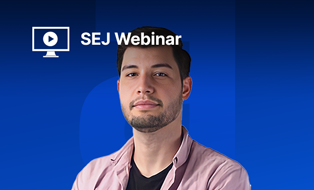
![[SEO, PPC & Attribution] Unlocking The Power Of Offline Marketing In A Digital World](https://www.searchenginejournal.com/wp-content/uploads/2025/03/sidebar1x-534.png)